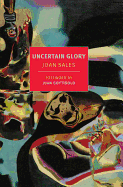
Joan Sales was a Catalan writer and publisher who fought with the anarchists and communists in the Spanish Civil War before going into exile from the Franco regime. His lyrical and painfully intimate war novel, Uncertain Glory, was first published in 1956. This translation by Peter Bush brings to the English-speaking world a rare anti-war epic, one that resists lionizing its beleaguered heroes, furthermore undermining and unraveling what they believe in. The novel is narrated in turn by Lieutenant Lluís, posted to the Aragonese front; his estranged lover, Trini, left in Barcelona; and the aspiring priest Cruells, who tries to reconcile his spiritual beliefs while witnessing the defeat of anti-Fascist forces. Romantic intrigue transpires as Lluís is drawn to a mysterious widow who enlists his help in securing her estate. Trini learns of the relationship and visits the warfront herself.
Much of this romantic conflict is revealed in letters the characters write to each other. Central to the plot is an old family friend and eccentric visionary named Juli Soleràs, to whom Trini pens her concerns. Soleràs gives the novel intellectual depth in the form of ironic, philosophizing dialogues. He dissects and questions the motives of his friends and the various ideologies in conflict. "And, believe me, don't ever trust people who don't have imagination," he says in a sharp critique of Marxists. "They are terrifying!" Despite its pessimistic ethos, the novel contains quiet, impressionistic reflections that serve as a bittersweet salve to the human atrocities. With "infinite sensitivity," Lluís describes the evanescence of nature and experience: "It was dusk and the music seemed to meld into the glow, the scents and the exquisite dying fall of twilight."
Offering more than mere disillusionment, Uncertain Glory deconstructs warmongering idealism and exposes the many tragic ways humans pit themselves against each other. --Scott Neuffer, writer, poet, editor of trampset

